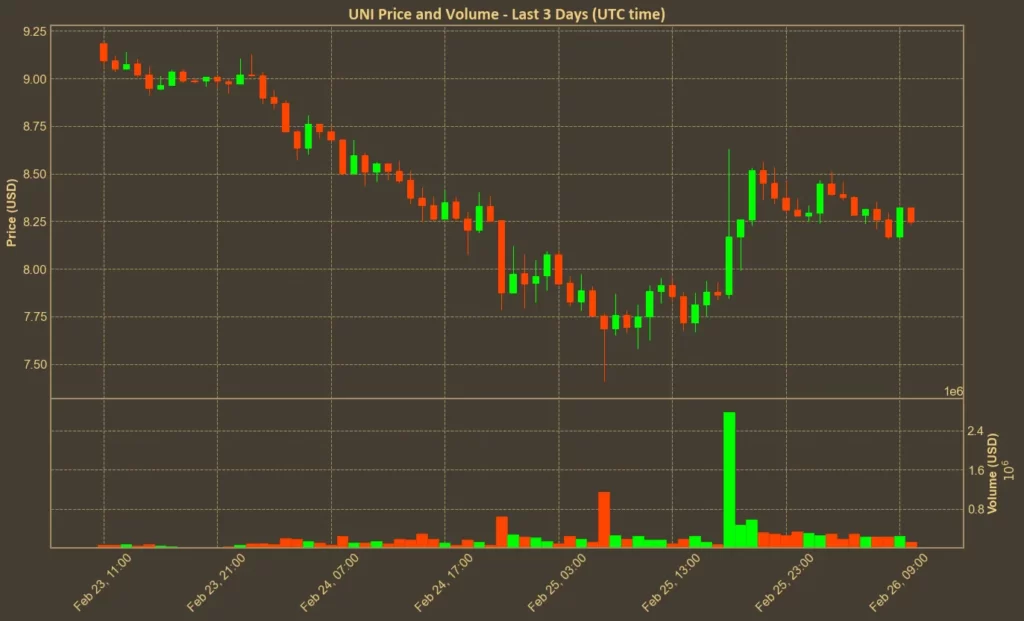The U.S. Securities and Exchange Commission (SEC) has been rapidly closing its investigations in the crypto industry over the past few days. It recently dropped cases against Coinbase, OpenSea, and Robinhood, and just yesterday, it ended its investigation into Uniswap.
These decisions mark a significant departure from the SEC’s previously aggressive stance on cryptocurrency regulation. With several high-profile cases now resolved, many XRP supporters are questioning whether Ripple could be the next to receive legal relief.
Table of Contents
Uniswap’s SEC Case Dropped
After three years of legal uncertainty, Uniswap Labs received the news it was hoping for – the SEC has officially closed its investigation without any enforcement action. The case, which began with accusations that Uniswap operated as an unregistered securities broker and exchange, ended quietly under the SEC’s new leadership.
Uniswap Labs celebrated the end of what had been a costly and stressful legal battle. The company called it a win not just for itself but for the entire decentralized finance (DeFi) industry. Hayden Adams, the founder of Uniswap Labs, expressed his gratitude for the more constructive approach taken by the new SEC leadership. He emphasized that this outcome could provide the regulatory clarity the DeFi sector desperately needs.
The announcement immediately impacted the market, with Uniswap’s UNI token experiencing a price surge as investors responded positively to the regulatory clarity. Although the token’s price remains down by 21% over the past month, the case closure could lay the foundation for more sustainable long-term growth.

Robinhood’s Case Ends
Robinhood also found itself off the hook as the SEC closed its investigation into its crypto trading platform. The case was centered around allegations that Robinhood was operating as an unregistered securities broker. After a year-long probe, the SEC decided not to take any enforcement action.
This decision provided much-needed stability for Robinhood, which had been struggling with regulatory uncertainty for months. It also signaled a change in the SEC’s enforcement strategy, as Robinhood had been one of several high-profile crypto firms targeted during the previous administration.
Coinbase Celebrates Victory
Coinbase had its own reason to celebrate as the SEC dropped its lawsuit against the exchange. The legal battle began in 2023, with the SEC accusing Coinbase of operating as an unregistered national securities exchange, broker, and clearing agency. The case had been closely watched as a potential turning point for U.S. crypto regulation.
CEO Brian Armstrong publicly celebrated the decision, emphasizing that no fines were paid and no changes were required to Coinbase’s business model. He described the outcome as a victory not just for Coinbase but for the entire U.S. crypto industry.
The closure of the Coinbase case is particularly significant because of the legal arguments involved. Coinbase had argued that the digital assets on its platform were not securities, challenging the SEC’s interpretation of securities laws. The dismissal of the case could set a legal precedent that impacts how other crypto assets are classified in the U.S.
OpenSea Investigation Closed
OpenSea, the leading NFT marketplace, also saw its SEC investigation end without any enforcement action. The SEC had issued a Wells Notice to OpenSea last year, accusing it of operating as an unregistered securities marketplace. However, the case was quietly dropped, reflecting the SEC’s changing approach to regulating digital assets. This decision is especially important for the NFT sector, which has been in regulatory limbo.
What Does This Mean for XRP?
With Uniswap, Robinhood, Coinbase, and OpenSea off the hook, the spotlight is now on Ripple and its ongoing legal battle with the SEC. Ripple has been fighting allegations that it sold XRP as an unregistered security since 2020. The case has heavily impacted XRP’s growth and adoption, particularly in the U.S. market.
Several signs suggest that Ripple could benefit from the SEC’s changing stance:
- Shifting Legal Priorities: The SEC’s new leadership appears to be reconsidering enforcement actions initiated under the previous administration. Ripple’s case could be re-evaluated as part of this broader shift.
- XRP ETFs in Progress: The SEC recently acknowledged several XRP exchange-traded fund (ETF) applications. Approving these ETFs would imply that XRP is a commodity rather than a security, contradicting the SEC’s current lawsuit against Ripple.
- Political Changes: The U.S. political landscape has become more crypto-friendly, influencing the SEC’s approach to digital assets. This environment could create a more favorable backdrop for Ripple’s case.
However, Ripple’s situation is more complicated than the other cases. Unlike Uniswap, Robinhood, Coinbase, and OpenSea, Ripple’s lawsuit has already gone through extensive court proceedings. In 2024, a judge ruled that XRP is not a security when sold on exchanges, but the SEC is appealing that decision. Dropping the case now could undermine the agency’s previous arguments, making a straightforward dismissal less likely.
A New Direction for the SEC
The SEC’s decision to drop cases against Uniswap, Robinhood, Coinbase, and OpenSea shows a broader shift in its regulatory approach. This change began after the previous SEC Chair stepped down, allowing new leadership to take over.
The new SEC appears to be moving away from “regulation by enforcement,” which involved using lawsuits to set regulatory precedents without clear guidelines. This approach was heavily criticized for creating uncertainty and stifling innovation.
Instead, the SEC is showing signs of favoring a more balanced regulatory framework. This shift is partly influenced by political changes in the U.S., where the new administration is more open to constructive dialogue with the crypto industry. The SEC is now under pressure to create clear, fair rules for digital assets, rather than relying on legal action to enforce compliance.
Need a quick and easy way to see what’s happening in crypto over the next few days? Check out our Crypto Events Calendar!




